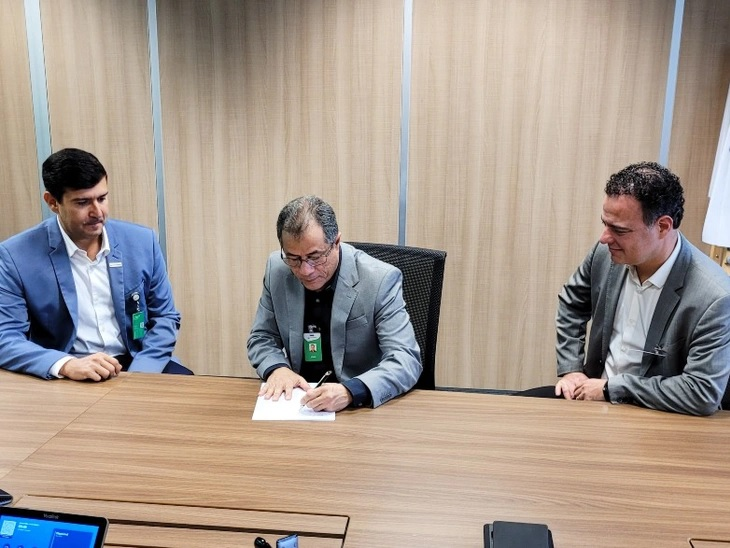Petrobras and Braskem Sign Agreement for Carbon Capture and Storage Studies in Bahia
The companies will jointly seek to identify business opportunities aligned with their strategies for diversification and competitive decarbonization.
T&B Petroleum/Petrobras Agency04/04/2025 12:05

In the photo: Jair Toledo, General Manager of Renewable Energy Project Design and Implementation at Petrobras; Stenio Jayme, Executive Manager of Onshore and Shallow Water Assets at Petrobras; and Gustavo Checcucci, Director of Energy and Decarbonization at Braskem, during the signing ceremony between the two companies.
On Friday, March 28, Petrobras and Braskem signed a Memorandum of Understanding (MoU) to deepen studies on potential Carbon Capture and Storage (CCS) project opportunities in the state of Bahia. The signing took place at Torre Pituba, Petrobras' headquarters in Bahia, located in Salvador. The MoU formalizes the companies’ intention to explore mutually beneficial business models within the low-carbon economy, in processes aimed at reducing carbon dioxide (CO₂) emissions into the atmosphere.
The two companies will jointly assess technical aspects related to CO₂ capture, transportation, and storage, as well as potential business models between the parties. This initiative could represent the initial development of a hub in the region. In such a hub, CO₂ is captured from various locations and emission sources (including petrochemical plants, refineries, steel industries, and thermal power plants), and transported through a connected pipeline network that can be shared and optimized to store large volumes of CO₂ in suitable, monitored geological reservoirs.
According to Jair Toledo, General Manager of Renewable Energy Project Design and Implementation at Petrobras, adopting the hub concept with connected infrastructure enhances technical and economic feasibility, positioning CCS as a relevant large-scale decarbonization option. “The petrochemical segment is one where Petrobras can add significant value, whether through potential low-carbon business partnerships or through commercial agreements linked to projects under development. These may include not only CCS but also renewable energy, hydrogen and its derivatives, and other low-carbon fuels,” explained Jair Toledo.
The agreement is part of a broader set of initiatives developed by Petrobras in collaboration with leading companies across various sectors. “This MoU demonstrates the commitment of both companies—Petrobras and Braskem—to building a more sustainable future, enabling a fair and inclusive transition to a low-carbon economy,” added Toledo.
At the Taquipe site, approximately 80 km from Bahia’s capital, Petrobras has already begun mapping geological reservoirs that could serve as safe CO₂ storage sites. The company is also studying safe locations within Bahia to integrate infrastructure for a CCS hub in the state.
Stenio Jayme, Executive Manager of Onshore and Shallow Water Assets at Petrobras, emphasized the significance of the initiative for the region: “Bahia is a highly promising location for CCS and other low-carbon businesses. We intend to use all the knowledge we’ve gained over the past decades to enable projects that support Brazil’s journey toward a just energy transition, always aligned with the country’s economic, social, and environmental development. This mission is embedded in Petrobras’ DNA and history,” he stated.
As part of its decarbonization journey, Braskem has already implemented a broad portfolio of initiatives that have simultaneously increased competitiveness. More than 1 million tons of CO₂ have been reduced through these initiatives, representing approximately 10% of its Scope 1 and 2 carbon inventory. However, both sectoral and global decarbonization challenges are immense. For this reason, studies, scouting opportunities, and the development of partnerships based on diverse technological pathways are essential. “We believe the synergies between Braskem and Petrobras have decisive potential to enable a faster energy transition aligned with Brazil’s reality. CCS is undoubtedly a pathway that deserves further technical and economic exploration, given its abatement potential and global reach. We are therefore pleased to join forces with Petrobras in this development,” said Gustavo Checcucci, Braskem’s Director of Energy and Decarbonization.



